News
The High Stakes Behind Kagame and Tshisekedi’s Talks in Doha
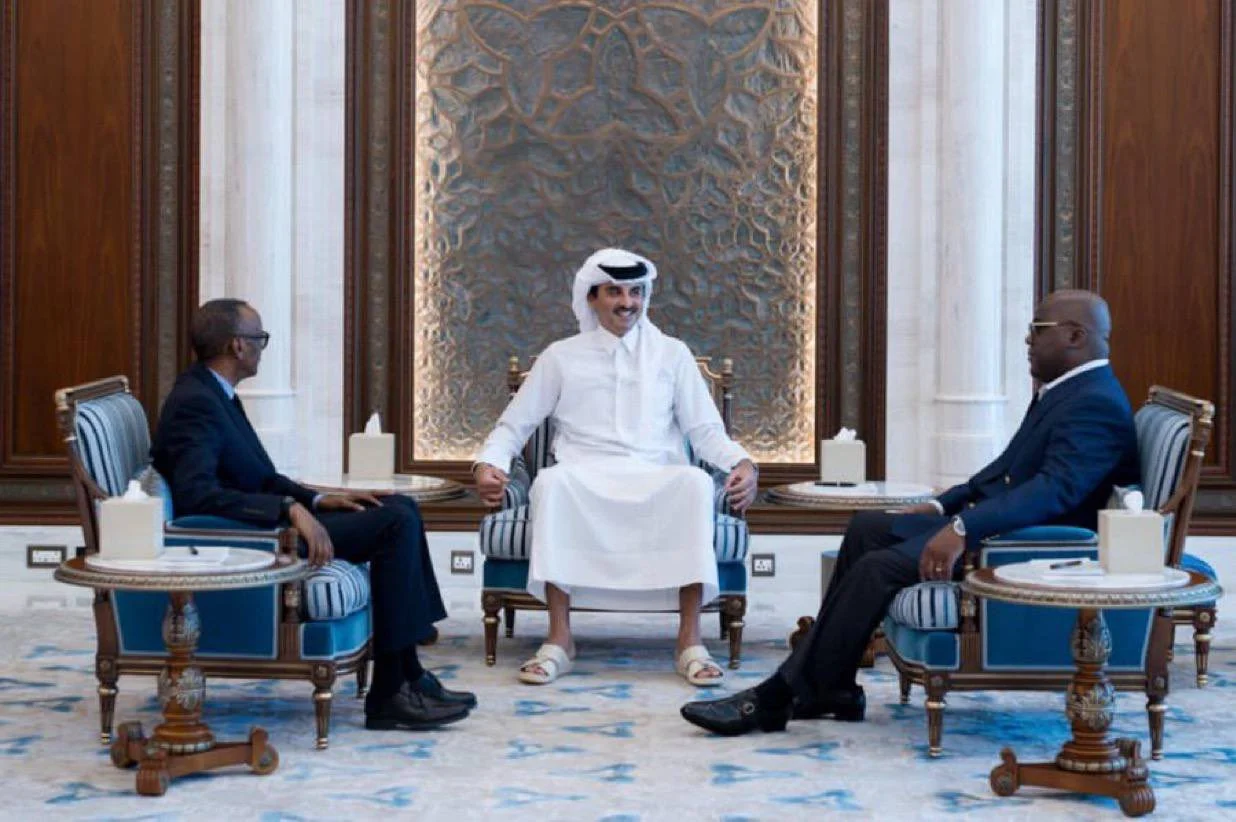
Rwandan President Paul Kagame and his Congolese counterpart Félix Tshisekedi met in Doha on Tuesday in a significant diplomatic breakthrough mediated by Qatar’s Emir Sheikh Tamim bin Hamad Al Thani.
The meeting, held at Lusail Palace, marked the first time in months that the two leaders sat across from each other, despite the worsening conflict in eastern DR Congo and growing international pressure.
For over two years, relations between Kigali and Kinshasa have been marked by open hostility, with Tshisekedi accusing Rwanda of backing the M23 rebel group, which has seized strategic towns in North Kivu province.
Kagame has denied the allegations and, in turn, pointed to the presence of the Democratic Forces for the Liberation of Rwanda (FDLR), a militia with links to the perpetrators of the 1994 Rwandan genocide, as a persistent security threat to Rwanda.
Attempts by other African leaders, including Angola’s President João Lourenço, had failed to bring the two to direct negotiations.
But Qatar succeeded where others could not, raising questions about what changed.
Kagame’s office framed the Doha meeting as a reaffirmation of support for the joint East African Community-SADC (EAC-SADC) peace process.
Rwanda also emphasized the need to address the FDLR’s presence in eastern DR Congo and ensure regional security.
Meanwhile, Qatar’s Foreign Ministry hailed the discussions as an important step toward stability in the Great Lakes region. Although no immediate resolutions were announced, the meeting reflected shifting political calculations on both sides.
The fact that Tshisekedi, who had previously likened Kagame to Adolf Hitler, agreed to the talks suggests that Kinshasa’s diplomatic posture may be evolving.
His government had largely dismissed earlier mediation efforts, opting instead for military and diplomatic isolation of Rwanda, including pushing for sanctions.
But with the situation on the ground deteriorating and M23 fighters continuing to gain territory, the Congolese leader may have found it necessary to explore other diplomatic avenues.
Rwanda, on the other hand, has faced increasing international sanctions over its alleged support for M23.
The United States, the European Union, and other Western countries have imposed restrictions on Rwandan officials, suspended military aid, and pressured Kigali to disengage from eastern DR Congo. However, these punitive measures have not altered Rwanda’s position, and M23 remains a dominant force in the conflict.
This is where Qatar’s intervention takes on added significance. Unlike Western nations, which have approached the conflict largely through the lens of punitive measures, Qatar has opted for engagement.
Its interest in mediating the crisis is not purely altruistic—it is also tied to economic stakes in both Rwanda and DR Congo.
Qatar has made substantial investments in Rwanda, including a 49% stake in RwandAir and a controlling 60% share in Bugesera Airport, which is under construction south of Kigali at a cost of at least $2 billion.
These investments make Rwanda one of Qatar’s most significant economic partners in Africa. Meanwhile, Qatar has also signaled its intent to expand its footprint in DR Congo.
After Kinshasa established an embassy in Doha, Qatar pledged to support infrastructure projects, including the renovation of N’djili and N’Dolo airports in Kinshasa and Luano Airport in Lubumbashi.
The Gulf state has also expressed interest in the construction of a deep-sea port at Banana, a venture currently led by UAE-based DP World.
With these economic interests in mind, Qatar’s diplomatic maneuvering appears to be aimed at preserving stability in a region where it is increasingly invested.
By securing a face-to-face meeting between Kagame and Tshisekedi, Qatar has positioned itself as a key broker in a crisis that has defied multiple regional and international mediation attempts.
Whether this latest diplomatic push will yield tangible progress remains to be seen. Despite the meeting in Doha, fighting in eastern DR Congo continues, and M23 has yet to commit to any major concessions.
The Congolese government still demands that Rwanda withdraw its alleged support for the rebels, while Kigali insists that the underlying causes of the conflict—including the FDLR’s presence—must be addressed.
Nonetheless, the fact that Kagame and Tshisekedi were willing to engage in dialogue after months of heightened tensions suggests that the geopolitical landscape is shifting. The failure of previous mediation efforts, the military deadlock, and the economic interests at play may have contributed to bringing the two leaders to the table.
For now, Qatar has succeeded in achieving what others could not: breaking the ice. What comes next will depend on whether the momentum from Doha can translate into lasting diplomatic engagement.

News
Kabaka birthday run: Minister Mpanga hails Buganda Lands Board as he calls for more kit purchases
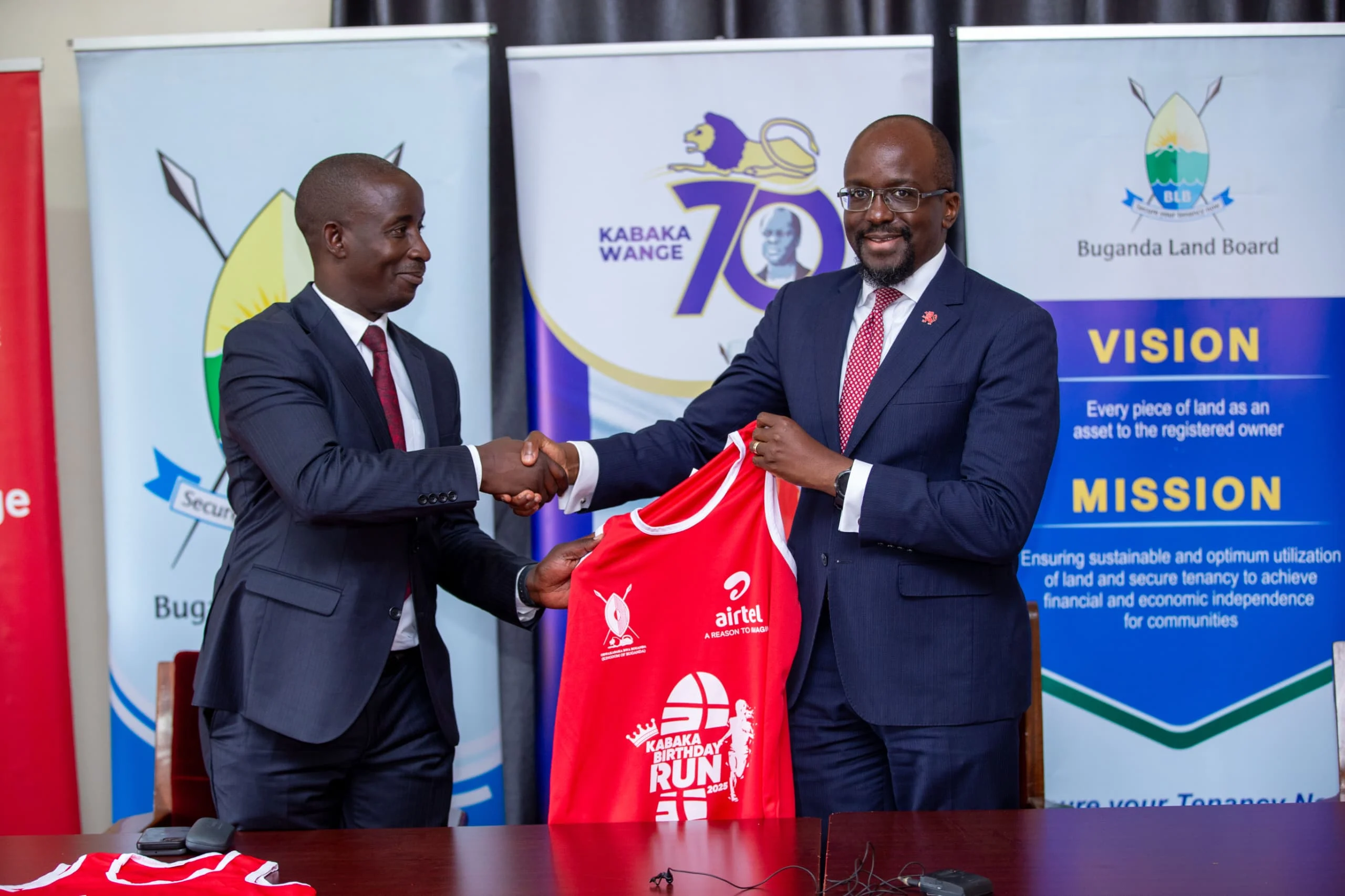
The Minister of Lands and Housing in Mengo, David FK Mpanga, has applauded the Buganda Land Board (BLB) for its active participation and support towards the upcoming Kabaka Birthday Run scheduled for Sunday, April 6, 2025.
The 2025 run will mark the Kabaka’s 70th birthday celebration under the theme, “Men for Good Health to Save the Girl Child.”
While handing over the Kabaka Birthday Run kits to BLB Chief Executive Officer Simon Kaboggoza at Bulange on Thursday, Mpanga expressed his joy over the board’s continued commitment to supporting the annual event.
“I am so much overjoyed to hand these kits to the Buganda Land Board who have confirmed participating in the Kabaka Birthday Run as the Kabaka celebrates 70 years of age,” Mpanga said.
Mpanga further encouraged the public to purchase the run kits, which are available at Bulange, Airtel shops, and various outlets.
He noted that the Kabaka himself will officially flag off the run at Lubiri, Mengo on Sunday.
“Let’s buy the kits, available here at Bulange, Airtel shops, and various outlets. Ssaabasajja Kabaka will flag off the run at Lubiri Mengo on Sunday, April 6,” he urged.
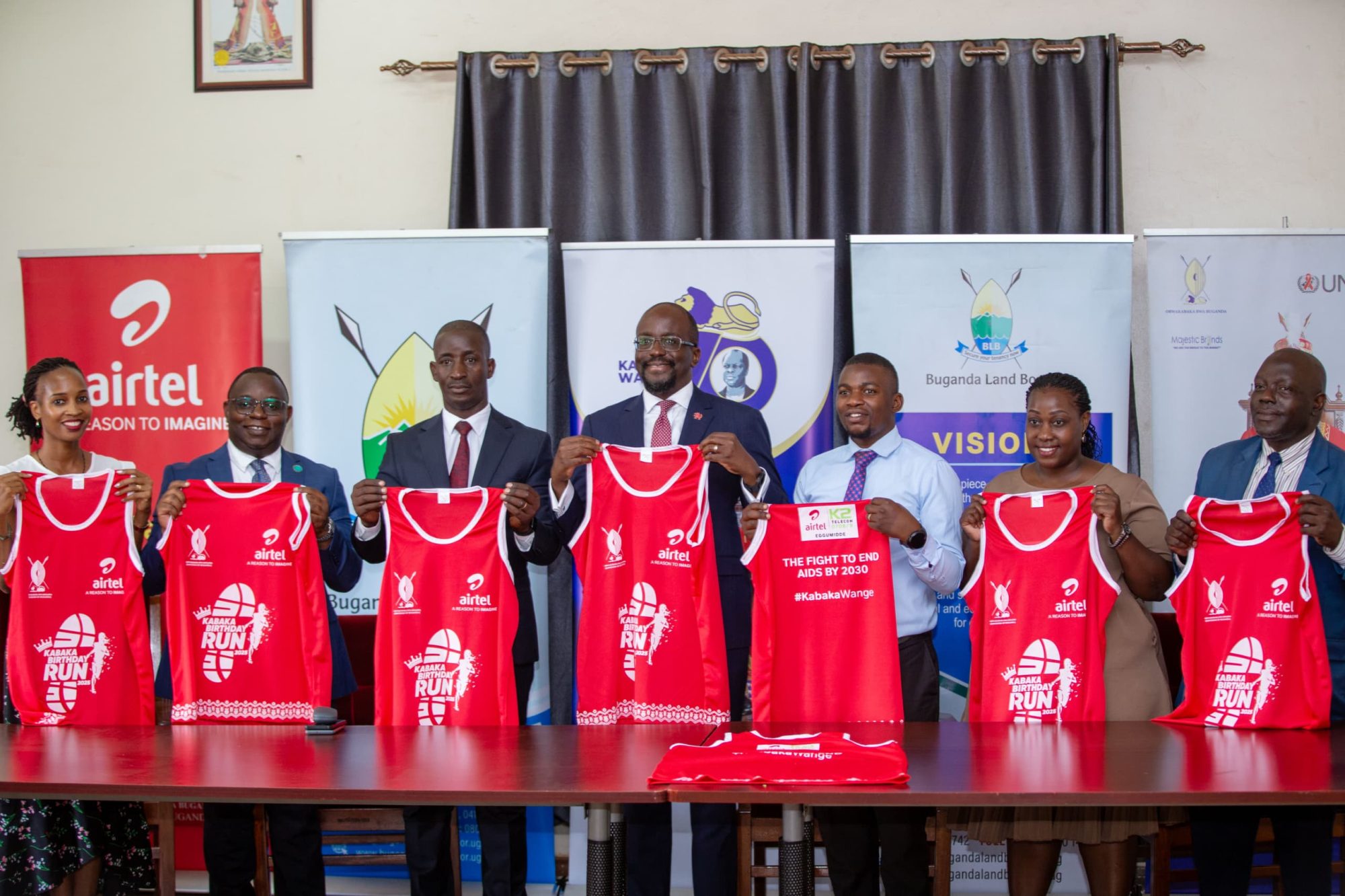
Speaking to the media after the kits purchase, Kabogoza emphasized that it is BLB’s responsibility to actively participate in the Kabaka’s Birthday Run every year as a way of celebrating the Kabaka’s birthday.
“It is our mandate as Kabaka’s servants under the Buganda Land Board to participate in this run. All our staff have received the kits, and we are ready to be there at Lubiri to join the Kabaka in the fight against the HIV/AIDS pandemic,” he said.
Mr Kabogoza further called upon all BLB employees and all tenants on Kabaka’s land to take part in the run on Sunday to fulfill the day’s theme. “I urge all occupants of Kabaka’s land also to use this opportunity to support the Kingdom by getting kits for the run,” he said.
The 2025 Kabaka Birthday Run is being held under the theme “Men for Good Health to Save the Girl Child.”
The initiative aims to mobilize men in the fight against HIV/AIDS, with proceeds from the kits contributing towards health initiatives targeting the protection and well-being of the girl child.
News
President Museveni Set for High-Stakes Visit to South Sudan
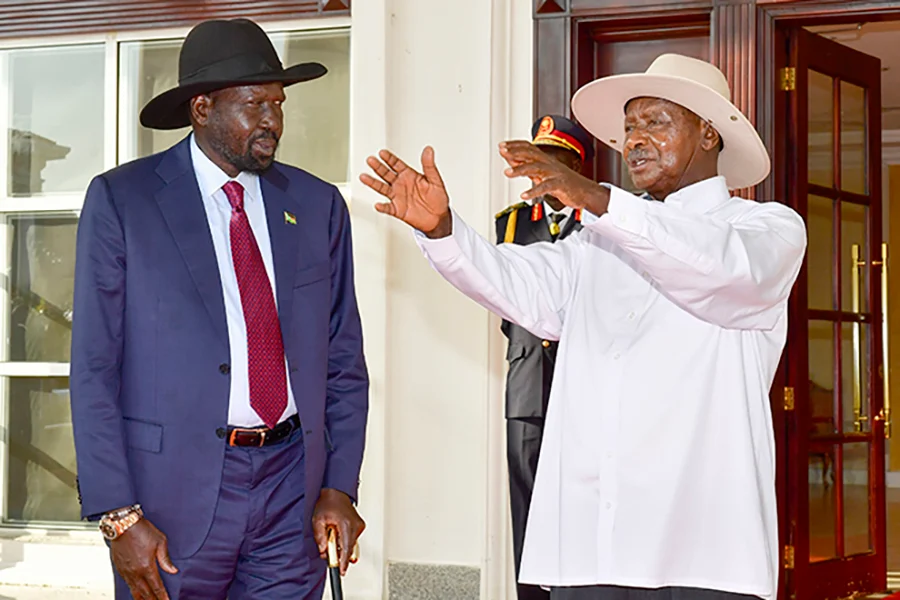
President Museveni is expected to travel to South Sudan tomorrow for a crucial meeting with President Salva Kiir, amid escalating political and security tensions in the country.
While the State House remains tight-lipped about the details of the visit, reliable sources confirm that the Ugandan leader will be in Juba on Friday.
Separately, the presidential press secretary Sandor Walusimbi confirmed to the Nile Post that the head of state had left for the restive youngest nation in the world.
Museveni’s visit comes at a time when South Sudan is facing severe turmoil due to internal conflicts within Kiir’s government.
President Kiir has recently fallen out with his First Vice President Riek Machar, leading to the latter and his wife Angelina Teny being placed under house arrest.
The deepening crisis threatens to unravel the fragile peace agreement that ended the country’s bloody civil war (2013-2018), during which Kiir’s forces, predominantly ethnic Dinka, clashed with Machar’s largely Nuer forces.
President Museveni’s visit is expected to focus on de-escalating tensions and seeking a resolution to the current political impasse.
Our sources revealed that Museveni will push for a renewed dialogue between Kiir and Machar, as well as address concerns over Uganda’s military presence in South Sudan.
However, given the deep-seated animosity between the two leaders, it remains uncertain whether Museveni’s intervention will yield any meaningful progress
Last week, Raila Odinga, the African Union’s High Representative for Infrastructure Development who doubles as Kenyan President William Ruto’s Special Envoy for South Sudan, visited Juba in an attempt to mediate between Kiir and Machar.
However, his efforts failed after he was denied a meeting with Machar. Odinga would travel back home via Entebbe for a meeting with Museveni.
He claimed that he had been asked by the Kiir government to seek permission from Museveni if he was to meet Machar, an allegation the South Sudan presidency has since strongly disputed.
The fallout between Kiir and Machar has been exacerbated by disputes over the peace implementation process, security force control, and the allocation of government positions.
Tensions escalated further last month when Uganda deployed its elite forces into South Sudan, a move that sparked criticism from Machar and his allies.
Machar has accused Uganda of violating international agreements by deploying troops and launching airstrikes against civilian targets in Upper Nile and Jonglei states.
In a letter to UN Secretary-General António Guterres, Machar called for the immediate withdrawal of Ugandan forces, arguing that their presence undermines South Sudan’s transition to democracy and threatens to reignite conflict.
In early March, Kiir ordered the arrest of several senior officials linked to Machar, including Petroleum Minister Puot Kang Chol and Deputy Army Chief Gabriel Doup Lam. Other military officials allied with Machar have been placed under house arrest.
The crackdown followed violent clashes in Nasir, a strategic northern town, where government forces battled the White Army militia—an armed Nuer group that fought alongside Machar’s forces during the civil war.
Tensions further escalated on March 7, when an attack on a military base in Nasir County resulted in the death of General Majur Dak Thel and several officers. President Kiir blamed Machar’s forces for the attack, further deepening the rift.
The situation worsened when Uganda’s Chief of Defence Forces, General Muhoozi Kainerugaba, confirmed the deployment of Ugandan commandos into South Sudan under the operation code-named ‘Mlinzi wa Kimya.’
In a social media post, Gen. Muhoozi praised the Ugandan Air Force for striking enemy positions, confirming Uganda’s active military engagement in South Sudan.
Machar has urged the African Union, the Intergovernmental Authority on Development (IGAD), and the United Nations Security Council to intervene and pressure Uganda to withdraw its troops.
He argues that Uganda’s military presence violates UN Security Council Resolution 2428 (2018), which imposed an arms embargo on South Sudan and was recently extended by Resolution 2731 (2024).
The government, however, has historically defended its military interventions in South Sudan as necessary to maintain regional stability.
Uganda played a key role in supporting Kiir’s government during the 2013-2018 civil war, deploying troops to prevent the capital, Juba, from falling to Machar’s forces.
As the situation in South Sudan continues to deteriorate, the outcome of Museveni’s visit could have significant implications for the region’s stability.
The international community will be closely watching the developments in Juba, hoping for a peaceful resolution to prevent another outbreak of violence in Africa’s youngest nation.
News
Bobi Mobilised People to Speak ill About me in my Constituency – Mpuuga
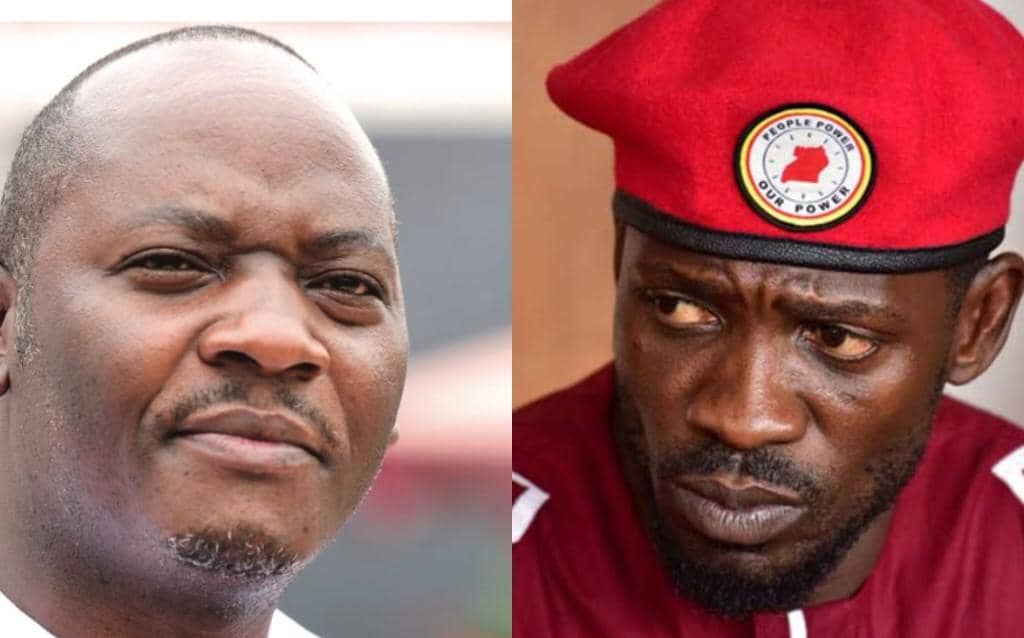
The national coordinator of the Democratic Alliance (DA), Mathias Mpuuga has accused Robert Kyagulanyi, also known as Bobi Wine, the president of the National Unity Platform (NUP), of rallying individuals to speak poorly of him.
Mpuuga, a former Leader of the Opposition (LoP), alleges that Kyagulanyi organized people for a month to disparage him in his constituency of Nyendo-Mukungwe municipality.
He made the remarks while speaking to NBS Television on Wednesday.
“The Hon. Bobi Wine all due respect to him, mobilised people for a month to go to my constituency to speak ill about me.” Mpuuga said.
He questioned why Kyagulanyi did not use the same effort to hold a rally against the Electoral Commission.
Mpuuga, who claims to have restrained himself from discussing certain matters and individuals, further accused his former party, NUP, of individually contacting MPs to portray him as a bad person.
“I have constrained myself a lot. If I spoke about certain things and individuals, you would be shocked. You would not know for example, how NUP would call MPs, one by one to educate them on how Mpuuga is a bad man.” Mpuuga said.
Mpuuga’s relationship with NUP soured last year after the party accused him of corruption for receiving a controversial Shs500 million as a “service award.”
This issue stemmed from a meeting held by the Parliamentary Commission on May 6, 2022, where Mpuuga and three other parliamentary commissioners reportedly divided a total of Shs1.7 billion among themselves as a service award, despite having served for less than a year.
Mpuuga allegedly received Shs500 million, while the other three commissioners each received Shs400 million.
This service award, which dominated headlines for months, led NUP leader Kyagulanyi to demand that Mpuuga apologize and resign from his position as Leader of the Opposition.
Since then, Mpuuga and Kyagulanyi have been at odds, with Mpuuga establishing his own civic organization, the DA, which many believe is aimed at countering NUP
-
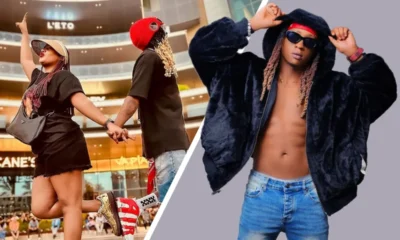
 Entertainment1 day ago
Entertainment1 day agoZiza Bafana Urges Beenie Gunter & Nickie Berry to Ensure Positive Co-Parenting Following Breakup
-

 Celebrity Gossip1 day ago
Celebrity Gossip1 day agoLydia Jazmine Opens Up on Her Relationship with Her Exes
-
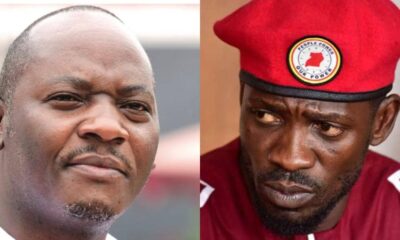
 News2 weeks ago
News2 weeks agoBobi Mobilised People to Speak ill About me in my Constituency – Mpuuga
-
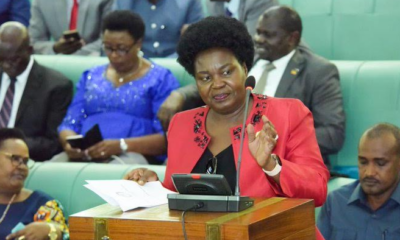
 News2 weeks ago
News2 weeks agoGovt Ready to Take Over Umeme Concession – Nankabirwa
-

 News2 weeks ago
News2 weeks agoShocker As Students Attack Police Station Over Teacher’s Detention
-
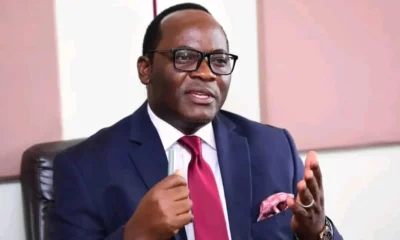
 News2 weeks ago
News2 weeks agoI don’t have any enemies in politics, I only have opponents- Mpuuga
-
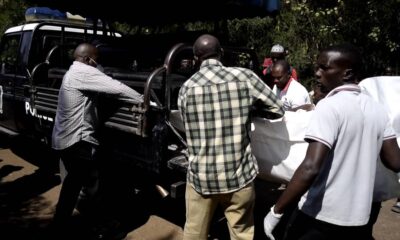
 News2 weeks ago
News2 weeks agoPoliceman Arrested After Wife’s Fatal Stabbing
-

 News2 weeks ago
News2 weeks agoMpuuga Accuses NUP of Sabotaging His Efforts for Dialogue




